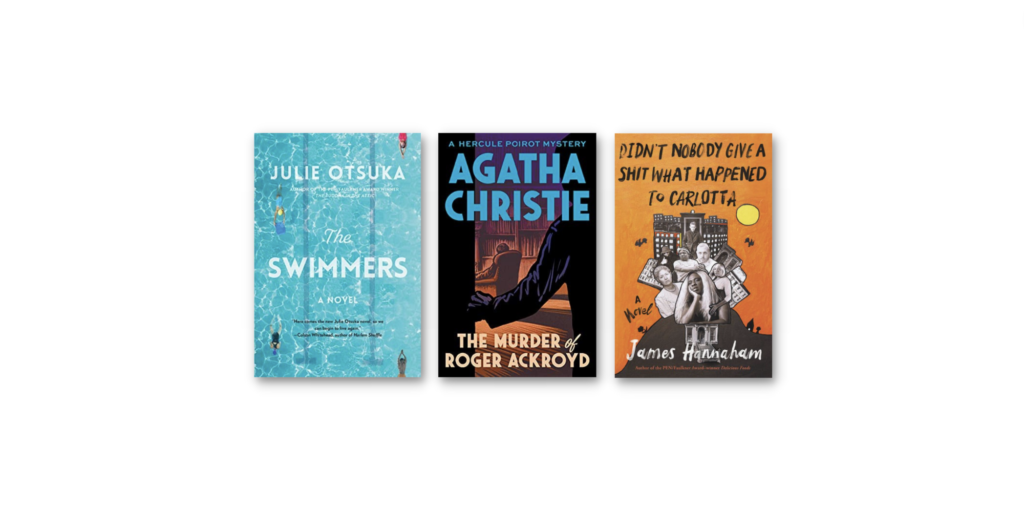When I was a teenager and I slept in my teenager’s bedroom in the basement of my parents’ house, I used to keep my stereo on all the time. Every moment that I was in that bedroom there was music playing. I kept it on while read at night, and then I left it on while I was asleep. I liked my music so much that I would have rather listened to it all night than go to sleep. My compromise was to try to do both at the same time. The lasting effect of this, aside from my residual insomnia problems, is that I have intense musical connections with many of the books I read in high school. This has given rise to some odd but unbreakable pairings, like whenever I happen to see a copy of Lloyd C. Douglas’ classic of historical fiction The Robe, I get songs from Bob Marley’s Legend stuck in my head. I can use these odd musical, literary pairings like an archeologist to dredge up memories from years ago. Likewise, I can look back over the books I read this last year and extract the various experiences that are wrapped up with each one. When 2003 began I set a goal to read 75 books over the next twelve months. I didn’t even come close. Unless I have left one or two off the list, and I may have, I read 29 books last year. I have many excuses for this, but the one I like the most is that I read a few books this year that I enjoyed so much that I couldn’t help but to savor them, to ingest them nibble by nibble as I pushed aside my silly goal of gluttonous literary consumption. What I’m saying is, it was a good year, so lets get started.Annals of the Former World by John McPhee: This monster of a book is McPhee’s paeon to the geology of the United States. As always McPhee is readable, but the ambition of this book (which is really five books in one) is what won him the Pulitzer when it came out. Sometime in the summer or fall of 2002 I read McPhee’s book about Alaska, Coming into the Country, because it happened to be sitting on the bench next to me on my break at the bookstore. Once I started reading it I was hooked, and I’ve been a big fan of McPhee’s ever since. This one is big (almost 700 pages) and it took me a while to read. I was also moving at the time to the house where I live now with fruit trees and a balcony and a guy who sells tamales out of the back of his car on our street every day. As far as I can tell, though, there are no exposed rock faces nearby and therefore no opportunities for amateur geology, though the book did manage to get me very interested in the subject.The Great Gatsby by F. Scott Fitzgerald: I have long bemoaned the huge gaps in my library. There are many classics that I have never read. As I recall, I was particularly struck by this notion early in 2003 and one Sunday night shift at the book store, afroth with my desire to get some of those classics out of the way, I dove into Gatsby. I read half the book that night on my breaks and the other half when I got home, staying up late to finish the last few pages. I hadn’t read a whole book in a day in a long time, and that felt good. When you digest a book as a single unit like that, you are able to look at differently. It’s like the difference between falling in love in one night and falling for someone over a period of weeks or months. I enjoyed the book, of course, though it is referred to so often, in so many settings, that it felt like I had already read it. Still, it was great to finally see what all the fuss is about.Gilligan’s Wake by Tom Carson: It was a very happy coincidence that I happened to read Gatsby right before I read this book because one of the sections of this book is an extended riff on the Daisy character. Gilligan’s Wake is a truly bizarre post-modern confection the created a minor splash at the beginning of 2003. It’s outlandish premise is to describe the lives of each of the characters of Gilligan’s Island before they went on their fateful three hour tour. The result is a vibrant pastiche of twentieth century history and popular culture, for, you see, the Skipper and Ginger and all the rest happened to lead very complex lives that intersected with the lives of some very important people. Having said that, this book isn’t a farce or a parody or anything like that, and in fact the language can be quite brutal. It might be best to describe the book as Pynchon soaked in TV culture. It’s an interesting read that I never would have come across had it not been for the fact that many of the folks at the book store read it when it came out.Imperium by Ryszard Kapuscinski: When I read Kapuscinski’s book The Soccer War a couple of years ago, I did so under the assumption that it was his best book. Maybe I was told this by a book store clerk somewhere, or I based it on Amazon rankings and reviews. It’s a very good book, kind of mind-blowing for me, really, since I had never read anything like it. I was very excited about discovering the work of this globe-trotting Polish journalist, but I assumed that his other books might be slightly lesser works. So, naturally, I was thrilled when I discovered that Imperium, his book about the Soviet Union and its fractured remnants, was a fantastic book, full of Kapuscinski’s usual personal insights and vision. This book propelled me on to a Soviet kick that would lead me to read several books on the subject before the year was out.The Story of Lucy Gault by William Trevor: For some reason, the review of this book in the New York Times put me in a real frenzy to read it. I think because it reminded me of Atonement by Ian McEwan, a book from 2002 that I really loved. Although I have read and enjoyed many of Trevor’s short stories, I just couldn’t get into this book. It was too even. There is a dramatic event at the center of this story but it is too buried by the passage of time to be a driving force.On Writing by Stephen King: I’ve always been a defender of Stephen King. As he will readily admit, he has written some clunkers for a buck, but his best books are really fantastic. I have also always enjoyed his writing about himself. This book is part memoir, part writing handbook, and part pep talk, and it is very readable. King avoids all the double talk that many writers will shell out when they write about writing. King manages to tell us that, just like anything else, writing is best when you have fun doing it, and if you’re having a lot of fun, it’s probably good enough to be publishedThe Adventures and Misadventures of Maqroll by Alvaro Mutis: This was the great discovery of the year for me, a book that I spent a lot of time on and a book that I never wanted to finish. I spent nearly two months reading this one, and Mutis’ book is so vivid with adventure and characters, it felt like I was living a double life. It all started with a review of the book by John Updike in the New Yorker early last year. I read the first few paragraphs and something clicked. I knew I had to read this book, and as soon as I started I knew it would be fantastic. Soon, I had convinced several coworkers to read it and we recommended it to many others. Over the course of the year my bookstore alone sold hundreds of copies, and friends of friends of friends were asking me if I had ever read this incredible book about a mysterious fellow named Maqroll. In March I happened to meet a hero of mine, Gabriel Garcia Marquez, and we talked briefly about Maqroll. Lately, my thoughts have turned to reading it again, and I’m thinking that sometime soon I will add it to my reading queue so that I can read it again soon, and I think I will probably keep it on the queue so that I can read it again every year or two. It’s just that good.American Studies by Louis Menand: After reading Menand’s Pulitzer prizewinner The Metaphysical Club, I added Menand to my list of favorite writers, so I was excited to read his follow up, a collection of essays with subjects ranging from T. S. Eliot to Larry Flynt. Menand is truly a master of the form, but I yearned for another book-length work that would allow him to really strut his stuff.Prize Stories of the Seventies: From the O. Henry Awards: I picked up this hardcover on a bookfinding expedition and had a good time reading through it. It’s chock full of pill popping divorcees and heavily cloaked anti-Nixon screeds. Joking aside, there are actually some truly remarkable stories in this book as I describe in this post from May 13th.Nine Innings by Daniel Okrent: I’ve always been a baseball fan, but it seems like I spent much of 2003 in a baseball frenzy. Recognizing this, my friend Patrick recommended this book to me and I really enjoyed it. Okrent spent months researching and preparing to write an entire book about a single game. The result is a detailed picture of the individual intricacies that combine to create one ballgame.That’s all for now. Parts 2 and 3 to come.



























































